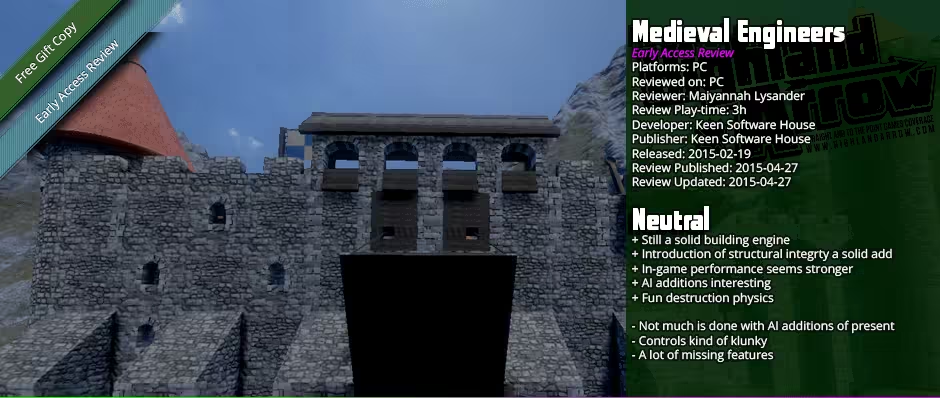

Medieval Engineers is a sandbox building game developed and published by Keen Software House. It is a thematic variation from their popular Space Engineers title, but the real question is - how is it different? Well, to be quite frank, it is more defined by what it subtracts from the formula rather than adds to it, quite unfortunately. Which is to say that Medieval Engineers peels back the progress of Space Engineers somewhat, seemingly in favour of some different toys. Some of them do add value, don't get me wrong - but not enough to make up for what's been taken away.
The same building mechanics that were strong
in Space Engineers return here, and they are still strong here
It's obvious from the onset, looking at the design and the interface that the same engine that powered Space Engineers is at work in Medieval Engineers as well, and to the developer's credit it's just as solid here as it was in Space Engineers. The voxel "blocks" fit together well, the addition of walls and some flavour decor certainly helps as well. It's always been a quite solid engine for building and that hasn't changed here. The grid method of building has been supplemented by a non-snap-to method that allows a lot more freedom as well, though it's worth noting that making proper walls with the new thinner walls added can be clumsy.
I could go into some further detail, but I feel it's redundant and repetitive, so if you're wondering about those base building aspects, check out the Space Engineers review I wrote previously.
Unfortunately what Medieval Engineers is mostly defined by is what it leaves out
While the additional building elements don't make up for is the kind of fundamental lack of a chief gameplay mechanic. I asked one of my friends whom I spoke with about this game - "What is it that you do exactly, mechanics-wise, in Medieval Engineers?" because I wasn't really getting it. "Build!" he most enthusiastically answered. And that's it, unfortunately, at least for now. This is like Minecraft sans the survival mode, and while there can be a lot of fun in simply playing with a digital version of Legos, many gamers will want more.
The missing features aren't just a mechanic beyond building however, it also lies in things like world-creation - Space Engineers boasts a comprehensive world creation screen in it's advanced mode that allows to tweak all variety of meaningful attributes to create precisely the kind of world that you want to build in, whereas Medieval Engineers boasts merely the choice between a few predefined worlds and a few paltry options, mostly whether to add the AI to the world and have the damage.
The notable additions to the formula
are the structural integrity, and the barbarian and wildlife mobiles,
and while interesting they aren't capitalised on
It's in these two, especially the latter, wherein lies the crux of the matter: one can see where they are going with this and what the deviance shall be from Space Engineers: it'll be in those roaming barbarians and the like, that angle - but unfortunately right now they serve only as something of an indicator of that possible future direction, not an actual mechanic in and of themselves. The structural integrity is an interesting add and it works brilliantly, requiring properly-supported construction throughout, and it leaves us with the tantalising possibility that the AI in the future could try to sap or otherwise undermine your walls. Right now however, all those barbarians will do is rove about and seek and destroy certain statues you can place. The proof-of-concept no doubt, but it has a ways to go yet, obviously, and that's a criticism I'd apply to the whole game.


